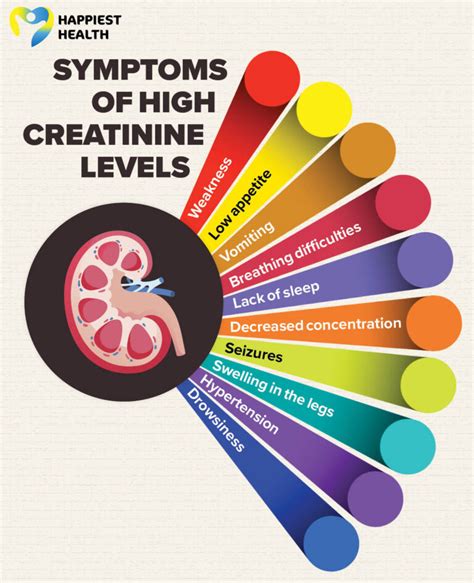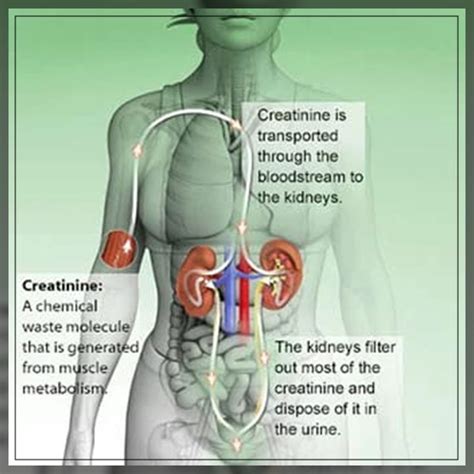Intro
Discover the importance of normal creatinine levels and learn 5 ways to maintain them, including diet, hydration, and lifestyle changes, to ensure optimal kidney function and overall health, preventing kidney disease and related complications.
Maintaining normal creatinine levels is crucial for overall health, particularly for kidney function. Creatinine is a waste product that comes from the normal wear and tear on muscles of the body, and the kidneys are responsible for filtering it out of the blood. When kidney function is impaired, creatinine levels can rise, indicating potential kidney damage or disease. Understanding the importance of maintaining normal creatinine levels and how to achieve this can significantly impact one's health and wellbeing.
The normal range for creatinine in the blood is approximately 0.6 to 1.2 milligrams per deciliter (mg/dL) for adult males and 0.5 to 1.1 mg/dL for adult females, though these ranges can vary slightly depending on the laboratory conducting the test. Factors such as age, gender, and body size can influence creatinine levels, making it essential to consult with a healthcare provider for personalized interpretations of test results.
For individuals looking to maintain or achieve normal creatinine levels, several strategies can be employed. These include dietary adjustments, lifestyle changes, and in some cases, medical interventions. It's crucial to work closely with a healthcare provider to determine the best approach, as underlying health conditions can impact the effectiveness and safety of these strategies. By understanding the factors that influence creatinine levels and taking proactive steps towards maintaining kidney health, individuals can reduce the risk of kidney disease and related complications.
Understanding Creatinine and Kidney Function

Understanding how creatinine levels reflect kidney function is fundamental to managing and maintaining normal levels. The kidneys play a critical role in filtering waste products, including creatinine, from the blood. When kidney function declines, the ability to filter out creatinine is compromised, leading to elevated levels in the blood. This is why monitoring creatinine levels is a key component of assessing kidney health and function.
Factors Influencing Creatinine Levels
Several factors can influence creatinine levels, including muscle mass, age, gender, and overall health. For instance, individuals with more muscle mass may have higher creatinine levels due to the increased breakdown of muscle tissue. Similarly, older adults may experience a decline in kidney function, potentially leading to higher creatinine levels. Understanding these factors can help in interpreting creatinine test results and in devising strategies to maintain normal levels.Dietary Adjustments for Normal Creatinine Levels

Diet plays a significant role in maintaining normal creatinine levels. Certain foods and dietary patterns can help support kidney health and reduce the strain on these vital organs. For example, a diet rich in fruits, vegetables, and whole grains can provide essential nutrients and antioxidants that support overall health, including kidney function. Additionally, limiting the intake of protein, sodium, and phosphorus can be beneficial, as these substances can put additional strain on the kidneys.
Nutritional Considerations
- **Protein Intake:** High protein intake can increase the workload on the kidneys, potentially leading to higher creatinine levels. Moderating protein consumption, especially for individuals with existing kidney issues, can help maintain normal creatinine levels. - **Hydration:** Adequate hydration is essential for kidney function. Drinking enough water helps the kidneys to function properly, facilitating the efficient removal of waste products like creatinine from the body. - **Electrolyte Balance:** Maintaining a balance of electrolytes, such as potassium, sodium, and phosphorus, is crucial. Imbalances, particularly high levels of these substances, can indicate or contribute to kidney dysfunction.Lifestyle Changes to Support Kidney Health

In addition to dietary adjustments, certain lifestyle changes can significantly support kidney health and help maintain normal creatinine levels. Regular physical activity, not smoking, and limiting alcohol consumption are among the lifestyle modifications that can benefit kidney function.
Exercise and Physical Activity
Regular exercise is beneficial for overall health, including kidney health. Physical activity can help maintain healthy blood pressure, reduce the risk of obesity, and support the body's metabolic functions, all of which can contribute to normal creatinine levels. However, it's essential to consult with a healthcare provider before starting any new exercise program, especially for individuals with existing health conditions.Medical Interventions for Kidney Health

For individuals with kidney disease or significant kidney dysfunction, medical interventions may be necessary to manage creatinine levels and support kidney health. This can include medications to control blood pressure and diabetes, dialysis for advanced kidney disease, and in severe cases, kidney transplantation.
Medications and Treatments
Certain medications can help manage conditions that impact kidney function, such as high blood pressure and diabetes. These treatments can help reduce the strain on the kidneys, potentially lowering creatinine levels. However, the use of any medication should be under the guidance of a healthcare provider, as some drugs can actually harm kidney function.Monitoring and Maintaining Normal Creatinine Levels

Regular monitoring of creatinine levels, especially for individuals at risk of kidney disease, is crucial for early detection and management of kidney issues. This involves regular blood tests to check creatinine levels and assessments of overall kidney function.
Preventive Measures
Prevention is key when it comes to maintaining normal creatinine levels and overall kidney health. This includes avoiding substances that can harm the kidneys, such as certain drugs and toxins, and managing chronic conditions like diabetes and high blood pressure.Conclusion and Future Directions

In conclusion, maintaining normal creatinine levels is a multifaceted approach that involves dietary adjustments, lifestyle changes, and in some cases, medical interventions. By understanding the factors that influence creatinine levels and taking proactive steps towards kidney health, individuals can significantly reduce the risk of kidney disease and related complications. It's essential for individuals to work closely with their healthcare providers to develop personalized strategies for maintaining normal creatinine levels and supporting overall kidney health.
What are normal creatinine levels in the blood?
+Normal creatinine levels in the blood are approximately 0.6 to 1.2 milligrams per deciliter (mg/dL) for adult males and 0.5 to 1.1 mg/dL for adult females.
How can diet affect creatinine levels?
+Diet can significantly affect creatinine levels. A diet high in protein, sodium, and phosphorus can increase creatinine levels, while a diet rich in fruits, vegetables, and whole grains can support kidney health and lower creatinine levels.
What lifestyle changes can help maintain normal creatinine levels?
+Lifestyle changes such as regular physical activity, not smoking, limiting alcohol consumption, and maintaining a healthy weight can help support kidney health and maintain normal creatinine levels.
We invite you to share your thoughts and experiences on maintaining normal creatinine levels and supporting kidney health. Your insights can help others understand the importance of this aspect of health and how to take proactive steps towards wellness. Please feel free to comment below or share this article with others who may benefit from this information. Together, we can promote awareness and support for kidney health and the maintenance of normal creatinine levels.
